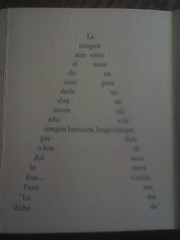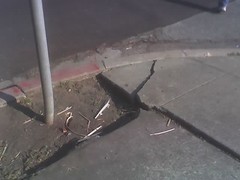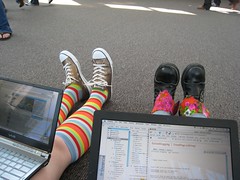In the last month, I've been going through my translations and poems from the last 10 years. My work schedule has been light - I am contracting, half-time. And there's a huge backlog of writing which I just never bothered to send anywhere, and didn't blog, figuring I'd send it out later. So, while I send these translations out to journals and publishers, I'll be focusing here on describing work I like, or going through some of my own work.
That sounds boring I'm sure, but let's start with a bang and talk about something super dirty. Let's descend into the mire!
Today I thought about my translations of Nestor Perlongher's poems. Nestor was an Argentinian gay rights activist, sociologist, and poet who died in the mid-90s. He lived in São Paulo for much of the 80s and 90s, and wrote in a mixture of Spanish, Portuguese, and Portuñol, with a little bit of gay street French thrown in. I have read a fair bit about the Argentinian Dirty War. A few years ago, I heard an mp3 of his long poem about the the disappeared, "Cadaveres". It blew my mind. I translated that poem and looked further on the net for his work. Not much was available, but what I found blew me away even more. It was weird, radically messed up, dirty, and queer as hell. It was difficult, disturbing, and beautiful.
Someone said the word "untranslatable" in my hearing. You know what happens next!
Perlongher was a sociologist who studied gay and transsexual street hookers in São Paulo. Wow, did he ever study them.
I am somewhat aware of the activism and politics around global human rights for queer and transgendered people. For example I have read plenty about human trafficking from Brazil to Europe and the U.S. and about the questionable safety of some of the more risky surgeries you can get done in Brazil (and elsewhere in the world). And I am somewhat aware as well of the cultures and communities of trans and queer, transvestite, drag queen, cross dresser, intersex, genderqueer, transsexual, and all that sort of thing in the U.S. There are some interesting differences between how trans people are viewed here vs. how they are viewed in much of Latin America. I set out to learn a bit about that, and did some reading in libraries and on the net as a background to translating Perlongher's poems. It seems to me in many ways that queer urban culture is more global than I knew or expected. Like house music, like the transcendence of Frankie Knuckles, Perlongher's genderqueer hookers would be at home in San Francisco or Chicago, Paris or Bangkok, as much as in São Paulo. And you have only to be even vaguely queer, to listen to Perlongher's voice reading "Cadaveres" in that mp3, to go pretty much instantly, "Okay, that is a gay man talking." If you think about gaydar, going across languages, it is pretty interesting.
Meanwhile, I was reading a bit more about the neobaroque (neobarroco) and neobarroso movements in South America and Cuba.
The poems themselves. What do I mean when I marvel at their spectacular dirtiness? It is hard to describe. They are slippery and pornographic. If you are my mom or something, just stop reading now, because I am going to describe the poetics of cocksucking. There is a pervasive sense of shifting ground, of a moving frame. A phrase will link to the phrase above it and mean one thing, and mean something else on its own when your reading-frame hits it and isolates, and means something else when linked with the phrase that follows; and again in the context of the whole poem, as a flickering impression or kinematoscope, layers up to create a general atmosphere, so that without actually having said the word "cocksucking" or "cum shot", you realize that is what you are reading about. Everything is sort of glistening and sticky. You think of glitter, flouncing, dive bars and back alleys and strip clubs. Celebratory sleaze. It's all blowjobs in the rain with smoky eyeshadow, in some over-romanticized Frenchified movie.
Perlongher's poetics go into the gutter and find amazing beauty - and often, beauty that ties sexuality to resistance to political oppression.
As perhaps you can imagine, the human rights of trans hookers on the streets are not a priority, say, to the police and government. If you are politically active in other areas as well, and you are gay in that context, there is not a lot of recourse for you legally and you are an easy target. But also, as a gay person in a straight world, you have particular survival skills and ways of acting collectively that come in handy during times of particular political repression. I think that is a good angle to keep in mind while reading Perlongher's work. Perlongher was an openly gay activist in Buenos Aires and in Brazil for gay and transgender rights. He also was around in the 80s and early 90s to watch everyone die. He is writes in a way that shows me he is aware of the violence and power imbalances in pornography and in the sex trade.
You see why I have come to love him dearly in the way that translators can love their poets who they have never known.
In the mean time his poetry is also wankery in the other, academic sense of the word, as in Baudrillard wankery, of spectacle and illusion and semiotics, the elusive and illusive web of meaning that surrounds absence & signs.
So, onwards to a snippet of poetry.
My disclaimer here is that I am super aware that in places I might just be dead wrong. And, the nonlinearity of the poem means that even if you understand every word in Spanish, you will be staring at the page wondering what the hell it means. (And, I considered every word's meaning in Portuguese as well, because he did double-triple meanings on purpose, or wanted words to evoke other words.) If you tell me I'm wrong and argue it and back it up, I will listen and be grateful for the help.
Consider this section from "Miché",
la travesti
echada en la ballesta, en los cojines
crispa el puño aureolado de becerros: en ese
vencimiento, o esa doblegación:
de lo crispado:
muelle, acrisolando en miasmas mañaneras la vehemencia del potro:
acrisolando:
la carroña del parque, los buracos de luz, lulú,
luzbel: el crispo: la crispación del pinto:
como esa mano homónima se cierne
sobre el florero que florece, o flora: sobre lo que
florea:
el miché, candoroso, arrebolado
de azahar, de azaleas, monta, como mondando, la
prístina ondulación del agua:
crueldad del firmamento,
del fermento:
atareado en molduras microscópicas, filamentosos mambos:
tensas curvas
the trannygirl
sprawled on the springs, in her cushions
jerks the fist gilded with leather: in that
conquering, or this submission:
of that which jerks
elastic, refiningfined in earlymorning miasmas the vehemence of the colt:
refined:
meatmarket of the park, holes of light, lulu,
lucifer: the jerk: the shuddering of the pinto:
like how that hand homonym purifies itself
on the flowery florist that flowers, or blooms: over that which
flourishes:
the hustler, straightforward, blushing
with orangeblossom, with azalea, like stripping bare, the
pristine undulation of water:
cruelty of the firmament,
of ferment:
busybusy in microscopic moldings, filamentous mambos:
curves tense
Okay, so, just consider that for a bit. I would love to publish the rest but I'll just wait on that for a while. But, if you were going to write a poem about handjobs without ever saying anything directly dirty, here is your model. If you read Spanish you may go and read the rest in the original. It is full of lube, pushing blunt heads, grease, drool, perturbing firmness, throats and petioles, oysters and curves, and shining above the grime and flesh, the sparkle and "authenticity" of gold lamé.
I'd love to talk some time about his poem about Camila O'Gorman. It seems to me to be a perfect encapsulation of a way that gay men see cinematic and tragic femininity. It is all melodrama and heroine and actress, mist and gauze, mixed with sex, death, and of course flesh and dirt. I read it and just can't believe how evocative and weird it is. It makes me think of the scene in Bataille's Blue of Noon where Dirty and the narrator are having sex and fall off a cliff in the muddy rain, or when they are messing with that priest's eyeball. But actually, sort of, the poem is about a 19th century pregnant teenager facing a firing squad. Where the rats and candle wax and worms come into this, I can't say, but they fit just fine.
I love reading Perlongher's poetry. Translating it is like being in poetic free fall. It is outrageously free and wild. It is maddening in its elisions. I could go on and on about it for a very long time, burbling.
Happy Poetry Month!









